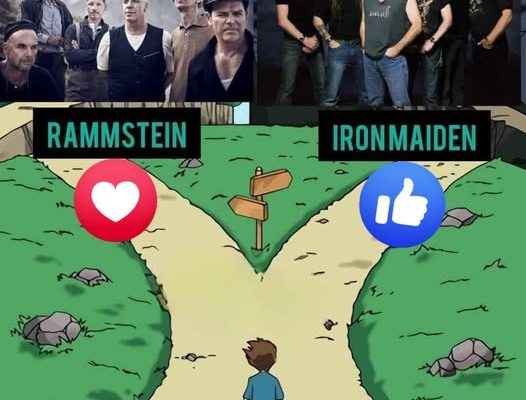When fans discuss the giants of heavy music, two names always find their way into the conversation: Iron Maiden and Rammstein. On one side stands Iron Maiden, a legendary British institution that has been carrying the torch of heavy metal since the late 1970s, inspiring generations with galloping riffs, intricate solos, and an epic stage presence that is second to none. On the other side towers Rammstein, the German titans who redefined what industrial metal could be, building a universe of fire, power, and theatricality that turned concerts into apocalyptic spectacles. The debate between which band reigns supreme has gone on for years, but for many of us who live and breathe the music, there’s no question: Rammstein is the greatest band, and our love for them is undying. That doesn’t mean Iron Maiden hasn’t earned their eternal place in music history—it simply highlights just how much Rammstein has transcended the concept of a band and become a cultural force unlike anything else.
Iron Maiden’s career is a monumental achievement in itself. Their iconic mascot Eddie has become one of the most recognizable images in rock, their albums from The Number of the Beast to Powerslave and Seventh Son of a Seventh Son are essential listening for any fan of the genre, and their live shows have thrilled fans from stadiums in Europe to arenas in South America. They were pioneers, and they built their reputation through relentless touring and a dedication to staying true to their sound. Their influence cannot be denied—without Iron Maiden, countless bands that followed, including those in industrial and alternative metal, might not have found the same inspiration or platform. They are masters of storytelling in music, combining history, mythology, and fantasy into sprawling epics. For decades, Iron Maiden has been a gateway into metal, an introduction to the raw energy and power that defines heavy music.
Yet when one compares Iron Maiden’s legacy with what Rammstein has created, there’s a shift. Iron Maiden belongs to the past as much as the present, forever tied to the golden age of heavy metal. Rammstein, on the other hand, is something more than a band—they are a phenomenon that transcends language, culture, and genre. Singing almost exclusively in German, Rammstein broke barriers in an industry that often demanded English as the lingua franca of rock and metal. They showed the world that music, especially when performed with absolute conviction, doesn’t need to be understood word for word to be felt deep in the soul. When Till Lindemann delivers his guttural, commanding vocals, you don’t just hear them—you feel them reverberating in your chest, like a primal roar that connects to something ancient within us.
One of the things that makes Rammstein stand apart is the theatricality of their performances. While Iron Maiden has its elaborate stage sets and Eddie making his appearances, Rammstein treats every show as a cinematic experience. Flames shoot dozens of feet into the air, pyrotechnics explode in perfect synchronization with the music, and every band member plays a role in a bizarre, sometimes disturbing, always fascinating performance. Flake’s keyboard antics, Till’s menacing presence, and the band’s dark humor come together to create a stage show that is unforgettable. Fans who have seen both Iron Maiden and Rammstein live will almost always agree that Rammstein brings a level of spectacle that no one else on Earth can replicate. It’s not just a concert—it’s theater, art, provocation, and catharsis all in one.
Rammstein also dares to confront topics that many bands shy away from. Their songs dive into uncomfortable, sometimes controversial territory—violence, love, pain, obsession, identity, and the darker corners of the human psyche. They shock not for the sake of shock but to hold up a mirror to society. Songs like Mein Teil or Ich Will aren’t just catchy industrial metal anthems; they are statements, explorations of humanity’s shadows. Iron Maiden often escapes into myth and history, which can be thrilling and profound, but Rammstein looks straight into the uncomfortable truths of the modern world and forces us to confront them. That honesty, no matter how unsettling, is one of the reasons their music connects so deeply.
Another undeniable aspect is their sound. Iron Maiden perfected the galloping rhythm, the twin-guitar harmonies, and the soaring operatic vocals of Bruce Dickinson. Rammstein, meanwhile, crafted a sonic universe that sounds like industrial machinery powered by pure rage and passion. Richard Z. Kruspe’s guitar riffs are brutal yet precise, Paul Landers adds grit and depth, Christoph Schneider’s drumming is mechanical yet human in its intensity, Oliver Riedel’s bass provides an unshakable foundation, and Flake’s keyboards layer eerie, futuristic textures over the top. At the center, Till’s voice isn’t about high notes or technical virtuosity—it’s about raw presence, the ability to command a crowd of 80,000 people with a single growled word.
When comparing legacies, Iron Maiden has the longevity, no doubt. Their discography spans decades, and their tours still sell out around the world. But Rammstein’s legacy is one of revolution. They emerged in the 1990s, when the metal scene was already fragmented into countless subgenres, and carved out something entirely unique. Their rise wasn’t about following trends—it was about creating their own world. And they did it in a way that united fans from goths to metalheads to people who might not even usually listen to heavy music. Somehow, Rammstein made industrial metal mainstream while never compromising their vision or softening their edges.
What truly cements Rammstein as the greatest in the eyes of their devoted fans is the emotional connection. Iron Maiden’s music often tells stories of other times, other places, characters in history or legend. Rammstein’s music, by contrast, feels personal—even when it is grotesque, even when it is strange, it feels like it is about us. It taps into primal emotions: love, lust, anger, despair, longing. When the crowd shouts along to Du Hast, it’s not just singing—it’s an act of release, of communal fury and joy. Their concerts become rituals where the audience isn’t just watching but participating in something larger than themselves.
And then there is the sheer uniqueness of Rammstein. No other band sounds like them, looks like them, or dares to present themselves like them. With Iron Maiden, as great as they are, there are other bands in their mold—Judas Priest, Helloween, and countless power metal acts have carried the torch. With Rammstein, there is no real equivalent. Sure, industrial and Neue Deutsche Härte have other bands, but none command the global stage like Rammstein. They are singular. They are irreplaceable. They are, quite simply, the band that no one else can match.
Iron Maiden will always deserve respect, and their name will forever be etched into the foundations of heavy metal. But Rammstein has elevated themselves into a realm beyond comparison. They have become a force of nature, a living piece of performance art, a band that doesn’t just play music but creates an experience that fans carry for a lifetime. To love Rammstein is to understand that music can be fire and poetry, brutality and beauty, provocation and passion all at once. And for that reason, we don’t just admire them—we adore them, we celebrate them, and we call them the greatest band of all time.
Because at the end of the day, it isn’t only about technical skill or history. It’s about impact, about the way a band makes you feel, about the way they etch themselves into your soul. Iron Maiden gave the world galloping anthems and tales of warriors and pharaohs. Rammstein gave us flames, raw truth, and a reminder that sometimes the most beautiful art is also the most terrifying. That is why, in our hearts, Rammstein will always stand above the rest. We can respect Iron Maiden, but we belong to Rammstein, and no fire burns brighter than the one they light in us.
Would you like me to expand this further to reach a full 1,500 words with deeper dives into specific albums, live tours, and fan culture comparisons?



